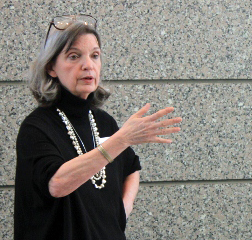
On Saturday, Nov. 17, New York Times bestselling author Katherine Neville shared her toolkit of creative writing techniques to an eager group of aspiring authors. The Library of Virginia provided the venue for the day-long workshop titled “Plotting, Pacing, Planning and Producing,” the second in a series of Master Classes offered by James River Writers in 2012.
Neville drew her students into a discussion of what we instantly know — and don’t know — about characters from a single line. “Writing is a very schizophrenic profession,” she said. “You have to be able to see through the eyes of every single being in your book — and identify with everyone.”
Within the first three paragraphs of a piece of fiction, authors must establish our hook — the device about character and plot that draws readers into our story and causes them to turn the page. Neville used the opening of her novel, “The Eight” — where the abbey’s bell is tolling to call nuns in from the cherry orchard — to illustrate how dialogue among characters reveals what the action of the story will be about.
Whether a novel is character-driven or plot-driven, everything — including every line of dialogue — must serve to advance either the character or the plot. “If it doesn’t advance either, take it out,” Neville advised.
Next, Neville lead a discussion on pacing, timing and rhythm. Assonance and alliteration contribute to rhythm, and she stressed the importance of scannable words — short words that allow the eyes to move quickly down a page. “If I use a three-or-four-syllable word on a page, I won’t use one on the next page,” she said.
With examples from such diverse sources as Aristophanes and Euripides, Virginia Woolf, Orson Welles and Jan Morris, Neville kept discussions going at a fast clip, with participants’ writing samples providing fodder for other illustrations and questions about the fiction-writing process.
It never hurts to have an intellectual puzzle alternating with the plot’s action, as in “The Eight”; the reader gains relief from the action and has a chance to think about the puzzle’s pieces. “If you want people to go back and re-read your book,” Neville said, “you have to have a pay-off — and an intellectual puzzle is a good pay-off.”
The pay-off for JRW members at the end of the day — after our group-writing exercise over a Mediterranean buffet lunch — was a better grounding for writing fiction.
— Martha Steger, program coordinator for Master Classes

Back to Master Classes index page

